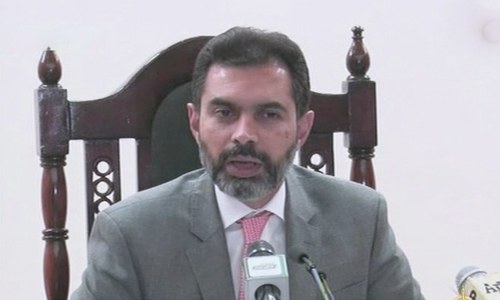The State Bank of Pakistan (SBP) kept the key interest rate unchanged at an eight-year high of 13.25 per cent in its last monetary policy announcement, which came a few days late than expected. But that was the easier part of the job because the Monetary Policy Committee (MPC) felt the outlook for inflation remained ‘broadly unchanged’.
The harder part for the MPC was to obscure the failures of the government to collect the targeted taxes, control food prices and boost export growth. Perhaps the most difficult part was to convey the message to the people and businesses struggling under harsh economic conditions that GDP growth during the present fiscal year will be slower than the bank had consistently projected since July 2019 and that the possibility of additional taxes before the end of the year cannot be ruled out.
The bank’s assertion that the real interest rates — the difference between the nominal interest rate and the headline inflation rate — at the current level of 1-2pc on a forward-looking basis aren’t high by any standard means the cost of the money will remain significantly high unless sticky inflation starts falling and comes down from the projected 11-12pc for the present fiscal year to 5-7pc over the next six to eight quarters.
The bank sees no evidence of the materialisation of “second-round effects on inflation” from supply-side shocks but cautions, if sustained, “high food price inflation could lead to demands for faster wage growth and to possible risks of a wage-price inflation spiral”.
A central bank can do only so much to revive an anaemic economy
It is something the bank has not touched upon in recent months and cannot be ruled out given the fact that food price inflation is broad-based and long term in nature because of periodic supply disruptions, unexpected shortages and the authorities’ failure to control cartelisation and retail prices. Should this happen, the policy rate will stay at its present level for a longer period even if the bank does not jack it up.
On the external sector, the bank pointed out that the current account deficit had contracted 75pc to $2.15 billion during the first half of the present fiscal year owing to a reduction in imports and modest growth in exports and workers’ remittances.
What is being referred to as modest export growth actually represents stagnation at best. Nor does the increase in the export volumes without an increase in revenues mean much. At best, the bank is trying to tell us that the export slowdown has been arrested and no meaningful increase is likely to come without boosting productivity, the chances of which happening any time soon appear quite slim at the moment.
The bank has itself admitted so in the policy statement, saying that growth in private-sector credit had decelerated to 2.2pc between July 1 and Jan 17 compared with 8.5pc growth in the same period last fiscal year, reflecting soft economic activity. However, it added, the loans under the SBP’s export finance scheme (EFS) and long-term financing facility (LTFF) for exporters had risen by 20.6pc and 13.2pc, respectively, during the same period. Growth in EFS is mainly attributable to an exponential surge in working capital needs of exporters on the back of a steep devaluation rather than an expansion in their capacity to produce more exportable surplus.
The rising LTFF also has more to do with their periodical requirements to replace their existing obsolete machines than addition to their capacities, according to exporters.
The bank took a lenient view of the government’s efforts aimed at fiscal consolidation, saying it has broadly remained on track and supported a qualitative improvement in the inflation outlook. It mentioned “healthy” 16pc enhancement in tax revenues in six months, but failed to mention the collection fell far short of even the revised target.
With the Federal Board of Revenue (FBR) facing a hole of Rs387bn in its collection in the first seven months of the current fiscal despite an inflation rate of 12pc and its retention of billions of rupees of export refunds, chances of it getting even remotely close to the revised target of Rs5.2 trillion appear dim.
Hence, the speculations about a mini-budget being introduced in the next couple of months or less are growing. Fiscal prudence without a significant boost in the tax-to-GDP ratio can anchor market sentiment and improve inflation outlook only so much.
Last but not least, the SBP is insistent that the slowdown in most economic sectors appears to have bottomed out and a gradual recovery is expected in coming months, but indicates a downward revision in its earlier projection of 3-3.5pc growth in real GDP “primarily on account of adverse supply-side shocks to cotton production as well as the contraction in the inward-oriented large-scale manufacturing”. And yet it has kept from giving a new, clear number!
That is understandable. After all, a central bank can do only so much for reviving an anaemic economy.
Published in Dawn, The Business and Finance Weekly, February 3rd, 2020















































